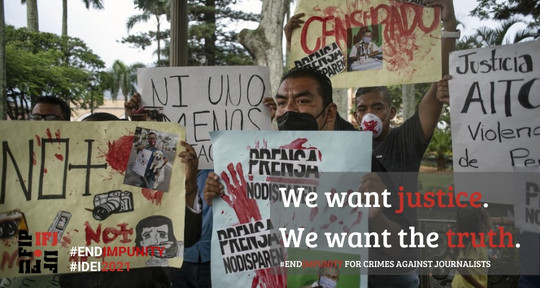Mexico remains one of the most dangerous countries in the world for journalists. The IFJ has already documented 9 killings in 2021, to be added to over one hundred murders (148 as of the date of this report) since 2006 - the beginning of the so-called "war against the drug trafficking".
A "war" that, following the decision of then President Felipe Calderón Hinojosa to send the Mexican army to fight cartels in the State of Michoacán, has claimed the lives of more than 250,000 Mexicans in addition to around 61,000 people going missing. Despite the declaration by current President Andrés Manuel López Obrador in 2019 that the war was over, violence continues to wreak havoc on the entire Mexican population.
The IFJ has consistently monitored and denounced the violence against media workers in Mexico in numerous publications, statements and actions.
Rampant crime against journalists is widespread throughout the country. Violence, murders, disappearances, rapes and displacements of journalists carried out overwhelmingly by criminal and paramilitary groups affect large swaths of Mexico. These levels of violence, in which some local administration officials connive with organised crime groups, are designed to silence critical investigations and crime reporting.
Despite the fact that Mexico has, for years, adopted dedicated mechanisms designed to protect journalists, such as the Law for the Protection of Human Rights Defenders and Journalists and the Special Prosecutor's Office for Crimes against Freedom of Expression (FEADLE), crime continued to increase, exposing the fact that such bodies have failed to deliver a guarantee of effective protection. At the same time, other state authorities, such as the judiciary, fail year after year to provide victims and their families with any kind of justice or reparation.
Impunity: the other side of the violence against journalists in México
According to the Sindicato Nacional de Redactores de la Prensa (SNRP), the IFJ affiliate in Mexico, out of the total number of crimes committed against journalists, 95% have remained unresolved.
This year, Mexican journalism was shooked by the exoneration of José Kamel Nacif Borge, one of the businessmen accused of ordering, with the former governor of Puebla Mario Marín, the kidnapping and torture of the journalist and human rights advocate Lydia Cacho in 2005.
Two emblematic cases have been solved recently: the murders of Miroslava Breach and Javier Valdez.
The killing of Miroslava Breach on 23 March 2017, who reported on organised crime, drug trafficking and corruption is one of the few cases that has ended with the sentencing of its killers. Juan Carlos Moreno, responsible for the murder of the journalist is currently behind bars, and the former mayor of Chínipas, Hugo Amed Schultz Alcaraz, pleaded guilty for giving information about Breach to the mastermind behind the crime.
In 2021, a second suspect was convicted for the murder of Javier Valdez, a well known journalist who had investigated the Sinaloa Cartel. The first one was imprisoned in 2020 and both of them were found guilty for the killing of the journalist.
In a country with a 95% rate of impunity, these convictions are historic. But in both cases, justice will not be complete until all the material authors and the masterminds behind their murders are brought to justice.
Killings in Mexico: a long lasting concern
In the last ten years, the IFJ has worked side by side with the SNRP to elaborate strategies and projects to assess and find solutions for the alarming situation of the press workers in México.
In 2014 a delegation the IFJ, FEPALC and FAPE (Spain) to Mexico held meetings with the Senate’s Special Commission for the follow-up of aggressions against Journalists and the Media, the Human Rights Attorney and the FEADLE. In 2019, there was another mission to México, this time within the framework of an international convention organised by UNESCO. IFJ Senior Vice-President Zuliana Láinez participated on behalf of the IFJ and FEPALC.
In 2015, Canadian union UNIFOR supported a project to improve the security conditions of press workers in México, including a series of activities, the drafting of a security protocol that is currently being used as a valuable resource by the SNRP.
With the support of the IFJ and FEPALC, the SNRP arranged in 2017 a meeting with the FEADLE to demand stronger commitment to investigating the killings of journalists and to conduct more meetings to follow up on the investigations process. At the time, the rate of impunity was 98% and the FEADLE had suffered constant budget cuts by the national administration. That same year, FEPALC organised its congress in México, in order to promote and participate in numerous activities in support of journalists and the SNRP.
The IFJ has continuously urged the Mexican authorities to take urgent steps to increase the effectiveness of the Protection Mechanism for human rights defenders and journalists. In particular, it called on judicial authorities to immediately resolve outstanding cases and make definitive progress towards reparation for the victims, so that Mexico can finally move forward in reducing the alarming levels of impunity.
To mark the World day to end impunity for crimes committed against journalists, the SNRP maintains that“Mexico is today, along with Afghanistan, Kosovo, Somalia and Yemen, one of the most dangerous and deadly countries for the professional practice of journalism, and the most lethal in Latin America. If in Mexico the different bodies and levels of government in charge of imparting justice do not act promptly and expeditiously, impunity for the murders of journalists will continue to be one of the democratic pending subjects of the Mexican governments, because it violates life, the right to work, freedom of expression and the citizens' right to know."

